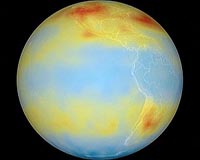| . |  |
. |
Fairfax VA (SPX) Feb 25, 2011 A new paper by George Mason University researchers shows that 'Climategate'-the unauthorized release in late 2009 of stolen e-mails between climate scientists in the U.S. and United Kingdom-undermined belief in global warming and possibly also trust in climate scientists among TV meteorologists in the United States, at least temporarily. In the largest and most representative survey of television weathercasters to date, George Mason University's Center for Climate Change Communication and Center for Social Science Research asked these meteorologists early in 2010, when news stories about the climate e-mails were breaking, several questions about their awareness of the issue, attention to the story and impact of the story on their beliefs about climate change. A large majority (82 percent) of the respondents indicated they had heard of Climategate, and nearly all followed the story at least "a little." Among the respondents who indicated that they had followed the story, 42 percent indicated the story made them somewhat or much more skeptical that global warming is occurring. These results stand in stark contrast to the findings of several independent investigations of the emails, conducted later, that concluded no scientific misconduct had occurred and nothing in the emails should cause doubts about the fact which show that global warming is occurring. The results, which were published in the journal Bulletin of the American Meteorology Society, also showed that the doubts were most pronounced among politically conservative weathercasters and those who either do not believe in global warming or do not yet know. The study showed that age was not a factor nor was professional credentials, but men-independent of political ideology and belief in global warming-were more likely than their female counterparts to say that Climategate made them doubt that global warming was happening. "Our study shows that TV weathercasters - like most people - are motivated consumers of information in that their beliefs influence what information they choose to see, how they evaluate information, and the conclusions they draw from it," says Ed Maibach, one of the researchers. "Although subsequent investigations showed that the climate scientists had done nothing wrong, the allegation of wrongdoing undermined many weathercasters' confidence in the conclusions of climate science, at least temporarily." The poll of weathercasters was conducted as part of a larger study funded by the National Science Foundation on American television meteorologists. Maibach and others are now working with a team of TV meteorologists to test what audience members learn when weathercasters make efforts to educate their viewers about the relationship between the changing global climate and local weather conditions. Ultimately, the team hopes to answer key research questions about how to help television meteorologists nationwide become an effective source of informal science education about climate change. "Most members of the public consider television weather reporters to be a trusted source of information about global warming-only scientists are viewed as more trustworthy," says Maibach. "Our research here is based on the premise that weathercasters, if given the opportunity and resources, can become an important source of climate change education for a broad cross section of Americans."
Share This Article With Planet Earth
Related Links George Mason University Climate Science News - Modeling, Mitigation Adaptation
 Black Carbon And Tropospheric Ozone's Role In Climate Change
Black Carbon And Tropospheric Ozone's Role In Climate ChangeParis, France (SPX) Feb 24, 2011 Black carbon (BC) and tropospheric ozone (O3) are harmful air pollutants that also contribute to climate change. The emission of both will continue to negatively impact both human health and climate. While our scientific understanding of how black carbon and tropospheric ozone affect climate and public health has significantly improved in recent years, the threat posed by these pollutants ... read more |
|
| The content herein, unless otherwise known to be public domain, are Copyright 1995-2010 - SpaceDaily. AFP and UPI Wire Stories are copyright Agence France-Presse and United Press International. ESA Portal Reports are copyright European Space Agency. All NASA sourced material is public domain. Additional copyrights may apply in whole or part to other bona fide parties. Advertising does not imply endorsement,agreement or approval of any opinions, statements or information provided by SpaceDaily on any Web page published or hosted by SpaceDaily. Privacy Statement |